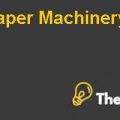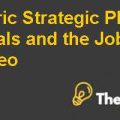Victoria Chemicals plc (A): Merseyside Project
1. Introduction:
The case presents a chemicals company “Victoria Chemicals” (VC) involved in the production of polypropylene, a polymer used in variety of products, and is based in United Kingdom through its subsidiary called Intermediate Chemicals Group (ICG). VC is a leading producer of polypropylene in its market and is one of the low cost producers among the top seven producers.
The company operates two plants, Merseyside, Liverpool (England) and Rotterdam (Holland). Merseyside and Rotterdam,Holland, the two plants were of identical scale, age, and design. There production facility is old, as it is constructed in 1967, therefore, it requires higher labor content than competitors' newer plants. They act as supplier to customers in Europe and the Middle East. In addition to numerous small producers, seven major competitors manufactured polypropylene in Victoria Chemicals' market at various cost levels.
2. Production process:
The production of polypropylene began with propylene, a refined gas received in tank cars from four refineries produced in refining crude oil into gasoline. In the first stage, propylene gas is combined with solvent in a large pressure vessel. In reaction, polypropylene precipitated bottom of the tank.
Second stage of the process compounded the basic polypropylene with stabilizers, modifiers, fillers, and pigments to achieve the desired attributes for a customer. Finished plastic product is extruded into pellets for shipment to the customer.
3. Proposed project:
There were pressure from investors to improve financial performance because of accumulation of shares by a well-known corporate raider, Sir David Benjamin. Earnings had fallen to 180 pence per share 2007 from 250 pence per share 2006. A capital project is proposed by plant managers of both sites (Merseyside and Rotterdam), which is to be evaluated and implemented for expanding the output (to increase polypropylene output at each of the respective plant by 7%). Strategical analysis pointed out that a total of 14% increase of polypropylene (due to 7% in each plant) is not feasible, therefore only one of the two plants can be accepted for this expansion and capital project.
Increased throughput would increase work-in-process inventory equal to 3.0% of cost of goods. It would also bring savings in cost and other efficiencies as lower energy requirement (energy savings assumed to be 1.25% of sales in 5 years and 0.75% in years 6-10. Thereafter, plant would revert to its old level, savings would be zero). In addition, project is expected to improve gross margin (before depreciation and energy savings) from 11.5% to 12.5%.
For this project, line would need to be shut down for 45 days, however, because Rotterdam plant was operating near capacity, Merseyside customers would buy from competitors. Greystock, immediate controller of Morris (plant manager of Merseyside plant), in his analysis believed that loss of customers would not be permanent.
In the first year of forecast engineering costs of GBP500,000 is spent over nine months on efficiency studies of the renovation. Corporate manual also stipulated that overhead costs to be reflected in project analysis is at the rate of 3.5% of the value of the initial asset investment for the project.
4. Problem Statement:
The problem statement in this case is:
- What is the Transport Division’s suggestion? Does it have any merit?
- What is the director of sales’ suggestion? Does it have any merit?
- What about the assistant plant manager’s suggestion?
- In the DCF analysis, is inflation correctly accounted for?
- What changes would you suggest Greystock make to his DCF analysis for Merseyside?
- Do you agree with the five criteria DC uses to make capital budgeting decisions?
5. Analysis:
What is the Transport Division’s suggestion? Does it have any merit?
Because of increased throughput resulting from the improved efficiency at the plant, Transport Division would have to increase allocation of tank cars to Merseyside. Currently, Transport Division could make this out of excess capacity, although doing so would accelerate the need to purchase new stock from 2012 to 2010, estimated to be GBP2 million in 2010. New stock would have depreciable life of 10 years. The transport division depreciated rolling stock using DDB for first eight years and straightline for last two years. These rolling stock could not be used outside Britain because of differences in track gauge and hence Rotterdam plant needs to arrange their raw material carriage themselves...
This is just a sample partial case solution. Please place the order on the website to order your own originally done case solution














